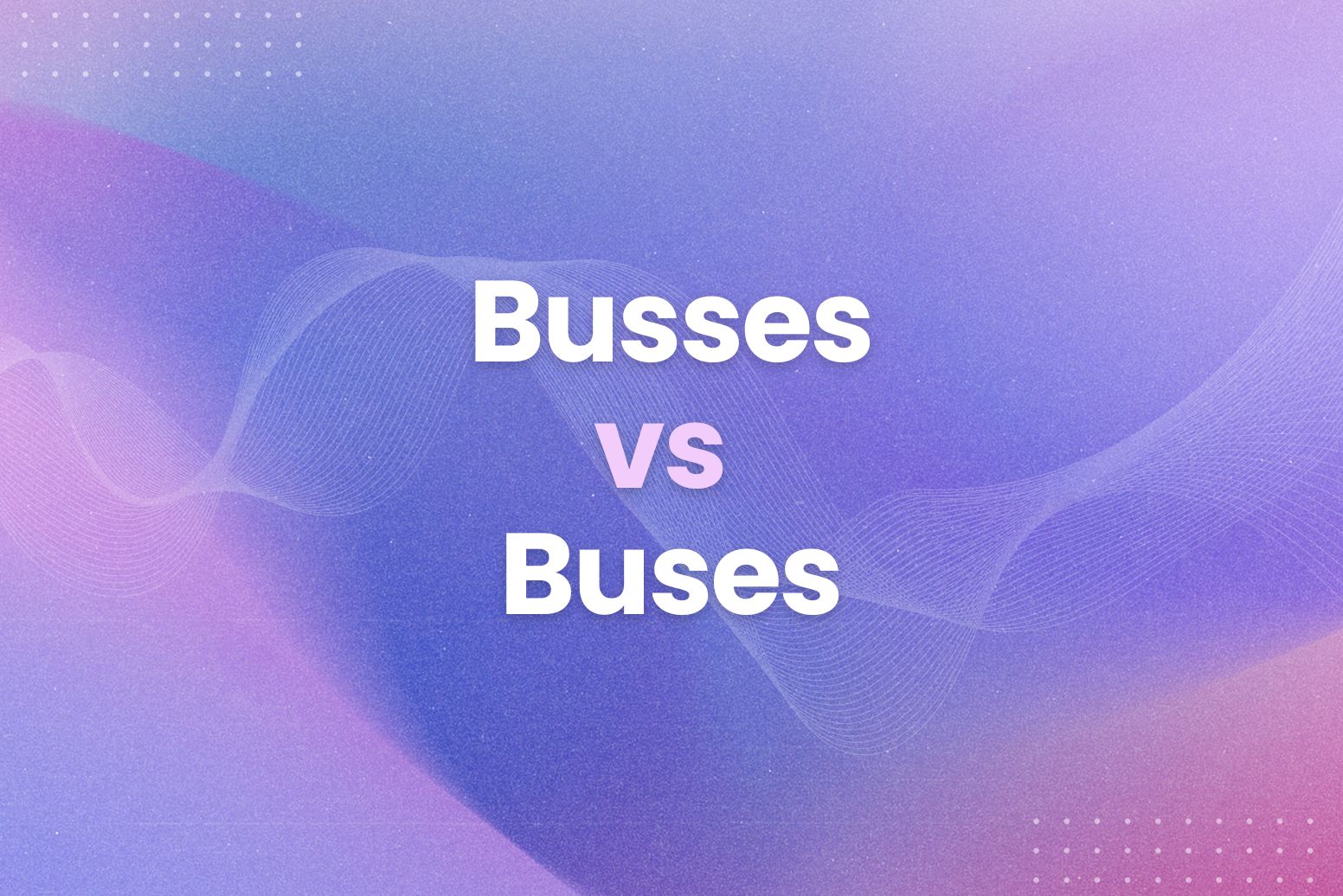Do you think you know how to spell the plural of “bus?” Is it busses or buses? Well, think again. It’s a trickier word than you might expect, and even experienced writers get it wrong sometimes.
We’re here to break down the busses or buses dilemma with a clear explanation and some handy tips.In this guide, you’ll discover:
- Firstly, the correct spelling of “bus” (plural)
- Then, a simple trick to remember it forever
- In the end, common errors to watch out for
Read on to find this and more.
The Correct Spelling: It’s “Buses” (Most of the Time)
The most common – and generally preferred – way to spell the plural of “bus” is buses. Simple as that.
However, there’s a bit more to the story. You might occasionally see “busses” used, and it’s technically not wrong. It’s just super old-fashioned. Think of it like saying “thou” instead of “you” – grammatically correct, but a bit odd in modern conversation.
So, why the confusion? Well, English has a lot of words that double the final consonant when adding “-es” (like “kisses” or “boxes”). But “buses” break the mold.
Pro Tip: If you’re ever not sure, “buses” is almost always the safe bet. And if you want to be extra sure, Arvin can double-check your spelling in a flash. Just highlight the word, and Arvin will tell you if it’s correct or suggest the right spelling.
Is There Ever an Exception?
While “buses” is the standard plural, there’s one situation where “busses” might actually be the better choice.
When “bus” is a verb:
Yep, “bus” can be an action word too. It means to transport people by bus. For example, “The school busses the children to the museum every year.” In this case, “busses” is the correct spelling for the present tense verb.
Confused yet? Don’t worry. It’s actually pretty simple.
- Noun (a vehicle): buses
- Verb (to transport): busses
Tricks to Remember the Correct Spelling
Now that you know the rules, let’s make sure you never forget them. Because let’s face it, who wants to keep Googling busses or buses every time they write?
Here are a few tricks to cement the correct spelling in your brain:
- Visualize it: Imagine a line of yellow school buses picking up kids. See how the word looks in your mind.
- Say it out loud: The plural “buses” has a clear “es” sound at the end. “Busses,” on the other hand, sounds a bit mumbled.
- Make an association: Think of another word with a similar pattern, like “focus” and “focuses.” Both words just add “-es” to the end.
Repetition is key. Write the word “buses” down ten times. Use it in a few sentences. The more you use it correctly, the more natural it will become.
Common Mistakes (and How to Avoid Them)
Everyone makes mistakes. Even the best writers sometimes have typos or grammar slip-ups. But when it comes to buses or busses situation, there are a few common errors we see time and time again:
- Using “busses” for the plural: This is the big one. Remember, “buses” is the standard plural for the vehicle.
- Mixing up “buses” and “busses” in the same text: Consistency is key. If you’re using “buses” as the plural, stick with it throughout your writing.
- Forgetting the verb form: If you’re using “bus” as a verb (to transport), then “busses” is the correct present tense form.
Read your work out loud. Often, we can catch mistakes when we hear them, even if we miss them when reading silently.
Some Examples of Buses and Busses
Remember, “buses” is the plural form of the noun “bus,” which refers to the vehicle. Here are a few examples of how you might use it in a sentence:
- “The buses were packed with commuters heading to work.”
- “Two red buses drove past while we waited at the stop.”
- “The city purchased new hybrid buses to reduce emissions.”
Now, let’s see “busses” in its natural habitat – as a verb meaning “to transport by bus.” Here are a few examples:
- “The restaurant busses its dirty dishes to the kitchen via a conveyor belt.” (This is a less common use of “busses,” but it’s still valid)
- “The school busses children to the zoo for their field trip.”
- “The company busses employees in from the suburbs each morning.”
If you’re ever unsure which spelling to use, try replacing “busses” with another verb like “transports” or “carries.” If the sentence still makes sense, then you’re likely using it as a verb, and “busses” is correct.
Never Confuse “Buses” and “Busses” Again
We’ve tackled the “busses” vs. “buses” dilemma from every angle. Now, you can confidently use the correct spelling, whether you’re writing about a fleet of double-deckers or a school bus route.
Here are the key takeaways busses or buses:
- Firstly, the standard plural of “bus” is buses.
- Then, use “busses” only when “bus” is used as a verb (to transport).
- Lastly, visualize, say it out loud, and practice to remember the correct spelling.
Arvin can be a lifesaver when you’re unsure about spelling or grammar. It’s like having a super-smart friend looking over your shoulder, ready to catch any mistakes and offer helpful suggestions. With Arvin AI Writer, you can write confidently and clearly, whether crafting an email, a blog post, or even a novel.
FAQs
Which is correct, busses or buses?
Buses is the preferred spelling for the plural of “bus” (the vehicle). However, “busses” is correct when “bus” is used as a verb (to transport).
Is it “buses” or “busses” in the UK?
Interestingly, both spellings are fairly acceptable in the UK. However, “buses” is still more common, even across the pond.
Is it “bused” or “bussed” in the UK?
Similarly, both “bused” and “bussed” are correct in the UK for the past tense of “bus” (to transport). Again, there’s no definitive rule, but “bused” is generally common.
What is the plural number of buses?
The plural of “bus” is already “buses” (or “busses” in certain contexts). So, there’s no separate plural form for multiple buses.








